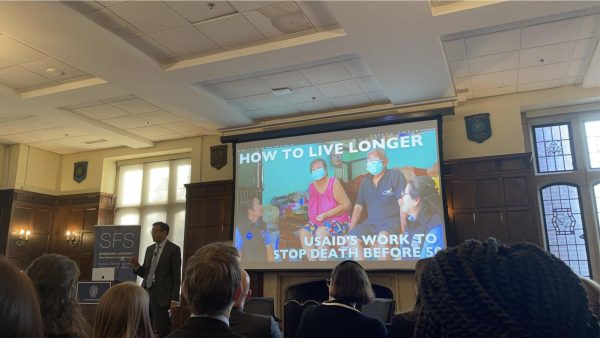A surgeon and global health administrator delivered the annual Maloy Distinguished Lecture in Global Health, hosted Feb. 20 by the Georgetown University Science, Technology and International Affairs program.
The event featured Dr. Atul Gawande, a surgeon and the assistant administrator for global health in the U.S. Agency for International Development (USAID), who spoke on promoting longer global lifespans and preventing death before the age of 50. The lecture series, endowed by graduates Paul (SFS ’68) and Catherine Maloy (NUR ’68) in 1999, spotlights innovators in global health and global health policy. Previous lecturers have included Anthony Fauci and Helene D. Gayle.
Since its inception in 1961 under the Foreign Assistance Act by President John F. Kennedy, USAID has sought to address gaps in health care services between the wealthy and impoverished, in particular through combating child mortality as a form of injustice.
According to Gawande, “It was the first time in the world a single agency was charged with foreign and social economic development. Beneath all of the inequities and setbacks we’ve had, including the pandemic, we see signs at USAID of winnings and successes that are now beyond all expectations.”
Kimberlee Holland, a medical sociologist and adjunct professor in Georgetown’s department of sociology, said that Gawande’s work plays a key role in addressing global health disparities.
“The big picture for all of us is recognizing that these disparities exist. They’re real, and they have consequences for real people,” Holland told The Hoya. “The surprise is that there are manageable answers for even the low-income countries, which means we can really reduce those disparities.”
Gawande explained that the most important factor in lengthening lifespans and preventing premature death in developing countries is primary health care (PHC) programs, the first contact a patient has with a medical service provider for a medical issue or disease prevention.
“There are about 60 countries where we’ve had sustained intervention,” Gawande said. “From those, there are a few that have matched our life expectancy without becoming rich. And that’s an extraordinary story for me.”
According to Gawande, several non-high-income nations like Thailand, Sri Lanka, Costa Rica and Chile have all matched U.S. life expectancy through their PHC programs, an astonishing accomplishment.
Gawande said that PHC is the driving force in extending life spans in these four countries and discussed the implications of strong PHC programs in both developing and developed countries like the United States.

“A country cannot achieve high-income status without being able to have its people live long enough to provide productivity,” Gawande said. “The outliers are showing us the way. We can make death before 50 rare by prioritizing primary care.”
According to Gawande, home outreach initiatives, where community volunteers and supervisors regularly visit households for check-ins and referrals, have proven effective in reducing premature death across several regions. In Thailand and Costa Rica, home outreach offers not only access to care but also financial support to community volunteers and supervisors.
“What we saw in Costa Rica was a 13% reduction in all-cause mortality over nine years, in a country where they were already starting out at an average of 75 years for life expectancy,” Gawande said. “No one was left behind. No one who may be ill or sick didn’t know about the services they had.”
These successes have sparked the development of the USAID Primary Impact initiative, which aims to build delivery programs in countries, including Nigeria and Kenya, by utilizing existing infrastructure and community resources.
“We launched what we called the USAID Primary Impact initiative, taking these lessons and bringing them to their neighbors,” Gawande said. “In order to do this, we are building primary health care plans based on the country’s own strategies. In all of these countries, what they had in common was their leaders had committed to a radical reorientation of their countries towards primary health care.”
Holland said that the United States has room to learn from the success of these nations, but will need to put forth a stronger sense of commitment to addressing primary care needs.
“I like community-based medicine in the sense that it meets people’s needs face-to-face. You’re meeting the needs earlier, and there’s all these latent benefits of those interactions,” Holland said. “There seems to be really economical ways in which we can provide basic primary care services to those who don’t have them and get real advantages and rewards out of it.”
Gawande said that the U.S. has made some progress in community PHC during and after the COVID-19 pandemic, but acknowledged that we still have a long way to go.
“Medicare and Medicaid are now making payments to primary health care facilities for outreach and other non-visit based services. We are missing the idea of geographic empanelment, but what we know is that low-cost primary health care and outreach are the key,” Gawande said.








